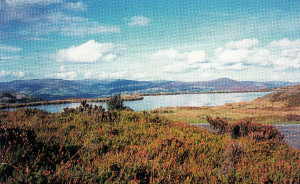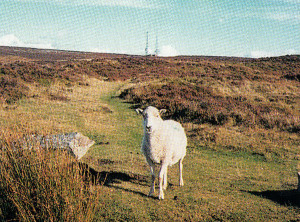
Have you taken part in a sheep’s identity parade? As a ten-year-old, walking with Ursula on the Coity Mountain near my South Wales home, we found a lost, bleating lamb. We carried the tiny bundle to the nearest group of sheep. Bearing the worried animal along the line of fleecy bodies, we knew we’d found the Mam when ewe’s and lamb’s cries agreed.
Visitors were amazed that sheep wandered through the streets of the town, unrestricted by fences, but they were also impressed that a farmer could train his dog to herd a flock as it responded to distant whistled commands. One man and his dog – and several hundred woollybacks.
The landscape glowed emerald green after rain, and the river, the Afon Lwyd, carved a bright silver ribbon in the valley below. From the summit of the Coity, the view took in the blue hills of Somerset and the coast as far as Weston-super-Mare. Lark song filled the air in summer, but winters were different.
November, sometimes October, brought the snow; not so much deep and crisp and even as dirty, slushy and impenetrable. Frosts were severe, winds bitter, and the drifts took a toll on livestock. Staff on the railways always had a plentiful supply of free mutton.
 One year, with my leg in plaster from a childhood illness, Dad, the village schoolmaster, pulled me to lessons on a sledge over packed snow – great fun for me, less so for him. But I enjoyed the lessons, and did not easily miss out on my education.
One year, with my leg in plaster from a childhood illness, Dad, the village schoolmaster, pulled me to lessons on a sledge over packed snow – great fun for me, less so for him. But I enjoyed the lessons, and did not easily miss out on my education.
Our school was cosy and welcoming. Big
wood-burning stoves stood in each room, which could be smoky, yet radiated a marvellous heat and had a distinctive smell. In those days we got our third of a pint of milk for morning break, together with tasty biscuits.
In the late 1950s traditional teaching methods were still valued. On Fridays we had tests, when we had to prove our grasp of spelling and the dreadful ‘tables’. If you were really good, you got a gold star! The tests
were taxing for a youngster, but I’ve been grateful ever since. I still know what seven times eight comes to without using a calculator.
We went home for Mam’s wonderful cooking at lunch time. One of my earliest memories is the smell of Welshcakes or bakestones (so called from the hotplate on which they warmed). They tasted marvellous. There has never been an adequate substitute for toasting in front of a blazing fire, yet starting it off using the right combination of Welsh coal, paper and sticks was another matter – a real skill now largely lost.
Our garden was huge, and even though it was more than 1,000ft. above sea level, my parents seemed to be able to grow anything. The strawberry crop was sizeable and, 40 years on, the lupins which once grew in our borders have seeded themselves to carpet the grounds of the nearby factory.
The coal waste tip loomed over the school, as in many Welsh villages, and the pit head winding gear spun quickly, drawing the colliers back to the surface. Grandad Philip had a highly responsible job – in charge of the lamp room, maintaining the miners’ safety lamps for warning of methane gas. Some of the family went down the mine at 14, and retired at 70.
I live now where in the early 1960s I pedalled my tricycle – often rounding a corner on two wheels for a dare and ending in a grazed heap on the unforgiving Tarmac.
Those were the days!
Roger Bowen








